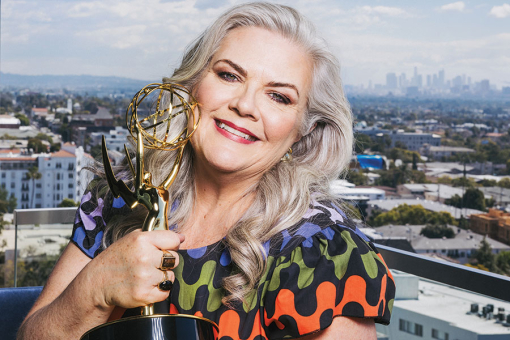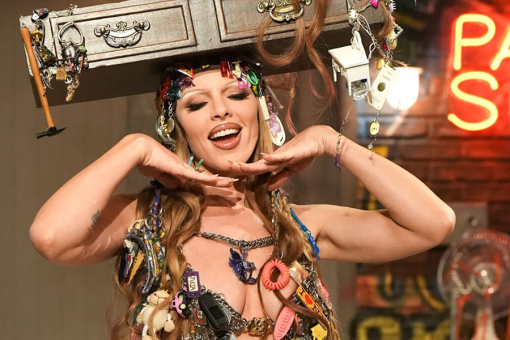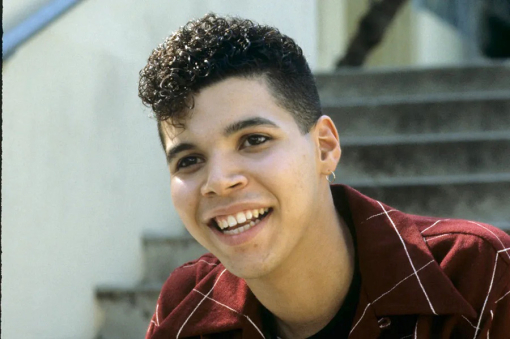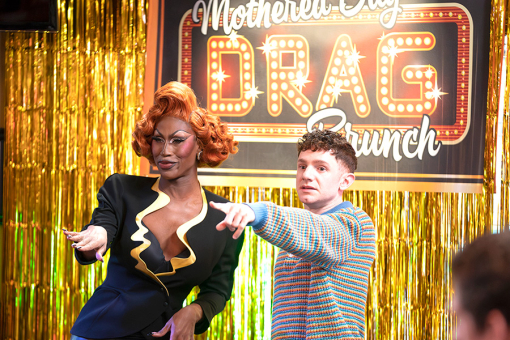Call it a glitz krieg. a trio of larger-than-life drag queens, dressed to the glittered nines, rolls into a small town in three bus-sized drag-mobiles, each vehicle themed to their perfectly painted personas — a giant purse, an oversized pair of puckered lips and a pimped-out four-wheeled pachyderm.
They're here on a mission, but when the sequined superheroes driving the Emmy-nominated series We're Here show up in places like Branson, Missouri, or Temecula, California, they're there to do a lot more than drag makeovers.
This show isn't Queer Eye in fishnets — not that there would be anything wrong with that — or a RuPaul's Drag Race maxi-challenge gone wild, or even a remake of the classic drag comedy To Wong Foo, Thanks for Everything! Julie Newmar. This is "realness" in real life. The drag queens of Here are there to demonstrate the healing power of high heels.
Now starting its eight-episode second season, the HBO Original series unites three of the most talented Drag Race alums — Bob the Drag Queen, Shangela and Eureka O'Hara — and pairs each with a fledgling "drag daughter," someone who rarely, if ever, has donned drag before. In little more than a week, each candidate must overcome their fears and overpaint their faces to star in a local drag show.
"When we come to town, we bring plenty of rainbows," Shangela says. Stilettoes are strutted. Emotions confronted. Confidence rises. Families embrace — though sometimes not. Whether a joyful or bittersweet outcome, these men, women and nonbinary folks always learn about themselves by dressing up as their most colorful alter egos — with help, of course, from the show's crackerjack team of makeup artists and designers.
In the process, they shed light on what it's like to live in a small town where they often feel misunderstood and unappreciated just because they're different. Even while lip-synching, as Bob says, "We're amplifying queer voices."
The show, which premiered in April 2020 and earned the GLAAD Media Award for Outstanding Reality Program a year later, "is about the queers in the small conservative places that Bob, Eureka and I all grew up in," says Shangela, who was raised as D.J. Pierce in Paris, Texas. Eureka (David Huggard) hails from Bristol, Tennessee. Bob (Caldwell Tidicue) lived in small towns in Alabama, Mississippi and Georgia before ending up in Atlanta by the seventh grade.
As adults, they have all made their homes on the coasts. But knowing the local territory hasn't made it easy for them to return to their roots. "We'll be in places where they'll drive by and scream, 'Faggots!'" Shangela says. "It does take you back. We're still here dealing with this."
Which is why those behind We're Here wanted to make the show.
"We thought, 'Okay, we love RuPaul, but what would happen if we took drag, married it to politics and brought it into small-town America?" says Stephen Warren, cocreator of the series with Johnnie Ingram. The night he and Ingram came up with the idea, he remembers, "Fireworks went off in our heads!"
Warren, a Hollywood entertainment lawyer and gay activist, and Ingram, a socially conscious advertising creative director originally from Tennessee, met with Casey Bloys, now chief content officer for HBO and HBO Max, and sold the series with little difficulty — though neither had ever produced a series before.
"HBO has a tremendous legacy of inclusive storytelling," Bloys told Esquire shortly after We're Here's premiere. "The commitment to depicting LGBTQIA+ stories is in the company's DNA." That green light meant, of course, that they had to find the right drag talent to anchor the series.
Glamazons are everywhere these days, with RuPaul's Drag Race having given international exposure to hundreds of performers. But Warren and Ingram — both executive producers of We're Here — chose not to cast a wide net. "We didn't talk to any drag queens other than these three," Warren says. "We had lunch with Eureka, dinner with Bob and lunch with Shangela." Those meetings were enough to sign them.
"It wasn't really a casting process. It was, 'We want you for the show,'" says Eureka, who made a splash this past summer on RuPaul's Drag Race All Stars. Shangela, whose post-Drag Race career has included a role in the Lady Gaga version of A Star Is Born, says she "jumped at the opportunity. I immediately thought, 'What if I had had a show like this on TV when I was a kid? What would it have done for me coming out and being proud to be a gay person?'"
Bob, the winner of Drag Race season eight and now a popular stand-up, took only a nanosecond longer to come around. "I didn't want to be on a show where gay people come and fix straight people's lives," she says. But once she was assured that We're Here was not going to be just "a show where we go in and tell straight people not to be shitty," as she puts it, Bob was sold.
Critics were sold, too. The New York Times called We're Here "genuinely moving," Entertainment Weekly dubbed it "pitch-perfect" and the Hollywood Reporter said the series is so fun, it's "nearly impossible to change the channel."
The show's creators give much of the credit for that appeal to the performers. "The artistry they each bring is so different," Ingram says. "Each of them is so smart and, on top of that, their emotional IQs are through the roof," Warren adds. "They're able to connect with people just by looking in their eyes."
Making that instant connection with prospective drag daughters is of paramount importance, since each episode of We're Here — from kinky-boots-on-the-ground to full-on drag extravaganza — is shot in less than 10 days.
Candidates are recruited via local LGBTQIA+ groups and, where they exist, queer community centers. "Our casting people start with those organizations and then reach out," Ingram says. "Because it's a small town, everyone is six degrees from each other."
Season two brought an added challenge. Now that We're Here is a hit, experienced drag queens in small towns have been pitching themselves to the show. "They see this as an alternative way to get their RuPaul moment," says director–executive producer Peter LoGreco. They don't make the cut.
Townies who are recruited usually stick with the program, as daunting as it may be to do drag in front of friends and neighbors. Should someone back out — and some people do have second thoughts — alternates are lined up.
Each person must be willing to share their back story, their hopes, fears and dreams, and then "sissy that walk," as Mama Ru would say, in corsets, heels and pounds of makeup.
"They really do show up and commit to do a lot in a week," Shangela says. "Not only are we going to have this amazing emotional breakthrough, but we're showgirls over here. When you're on Team Shangela, you come to do a show! "
Many of the locals have never seen a drag show, let alone been in one. "People don't realize, until they get to watch it, how entertaining drag can be," Eureka says. "And they don't realize how much work it takes to do drag."
It's worth the work, and candidates soon learn why.
Doing drag, Eureka says, is almost magically transformative. "It taps into a confidence that you wouldn't normally tap into. It gives you armor that you don't have as a queer person. You feel invincible. It's like you have superpowers, and in some ways you do. People listen to drag queens. They're so fierce. Even the haters are like, 'Well, she is pretty, though.'"
And, in every town, there have been haters. "We do turn heads both in and out of drag, just by being black and gay like Bob and me," Shangela says. Eureka says the group got looks for shooting season two while wearing personal protective equipment as part of strict Covid protocols. "In some of these small towns where they were like, 'We don't wear masks,' we were looked at crazier because we were being Covid-compliant than we were for being in drag," Eureka says.
While such moments can be uncomfortable, Eureka maintains that the cast never feels unsafe. There are plenty of people behind the cameras, and the cast's well-being is always the highest priority. "Our crew is a very healthy mix of orientations and identities. Everyone working together puts people at ease," says LoGreco, who is straight.
"Honestly, the crew gets more nervous for us than we do," Eureka adds, noting, "We've been through this." Promoters of stage shows often "book us in the smallest towns," she explains, "and then we're usually by ourselves."
Getting to know each town — walking the streets and visiting businesses — gives the cast a real taste of what life is like for the residents, and that helps the drag queens inspire courage in their charges. The candidates in season two are more varied than ever — one drag novice is a Muslim who sought asylum in the U.S.; another self-identifies as a "neuro-divergent gay trans man." As Shangela says, "It's the broadest spectrum of drag kids we've ever had."
Whatever their backstories, doing drag "shows them that they're stronger than they knew, and it shows their courage to the community," Warren says. In towns where the best that anyone who is different can hope for is "do your own thing, but don't talk about it," as Ingram puts it, We're Here lets people be gloriously themselves, whatever that may be. One shining moment onstage, it turns out, can change some peoples' lives forever.
Two very different middle-aged brothers, for instance, in Spartanburg, South Carolina — one a hairy good old boy, the other a professional drag queen — perform together in drag in season two. Even their elderly, conservative dad shows up to watch.
The straight son, Shangela recalls, "was a deer in the headlights. He would never have done drag if not for our show." But by episode's end — spoiler alert — he not only loses a beard but regains a brother, and he has such a good time doing drag that he vows to do it again. Such is the sway of sequins.
"Drag was very freeing for him," Shangela says. "Here is a straight white man living in the South, where everyone tries to hold on to this strong, macho energy. In releasing that and just going for it, he got to demonstrate his love of his brother."
The show has let the cast members demonstrate their love for each other, as well.
Though Bob, Eureka and Shangela had toured together on the drag circuit — as most Drag Race alums do after competing on the show — they were not close. They are now. "Their chemistry is unbelievably powerful," Warren says. "They're supportive of each other. If someone's down, they lift each other up."
The trio truly came together after sharing their tearful growing-up stories in the first-season finale. That episode was never supposed to happen. But when Covid shut down production of We're Here in March 2020 in Spartanburg, the show was short one installment.
"We didn't know how we'd come up with another episode," Ingram admits. "But we took a step back and said, 'Let's do a behind-the-artists episode. Where did they come from and how did they end up in this spotlight?'"
Unsure it would work, but willing to try, LoGreco assembled the cast via Zoom and had the drag queens — quarantining at home and at their most vulnerable — share their stories about growing up gay in small towns.
"There was an intimacy and an immediacy that allowed us to take a breath from the huge process of production and lay bare the soul of the show," LoGreco says. "It was a very happy accident, and we got lucky in getting it to work. I'm proud of all the episodes, but I'm most proud of that one."
In season two, the queens return to Spartanburg to finish what they started, and it's clear they've grown since the show began. "Our groove is even better and stronger than it was the first season," Bob says. "The more connected we become, the greater things we can do," Shangela says. "It's nothing but sisterhood at this point," Eureka adds. "Sometimes we get on each other's nerves, sometimes we laugh, sometimes we cry, but we always do it together."
Though fans may expect the life of a famous drag queen to be all spilling tea at the Ritz-Carlton, that's not always the case. "I've done my fair share of Four Seasons, and, with this show, I've done my fair share of Ramadas," Shangela says. "We need to live the experience of these small towns. I now have points at every hotel chain across America. If you want a free room at the Motel 6, I got you."
On location, Eureka has been known to whip up the kind of Southern food the cast was raised on. "Any time they give me a stove, I will cook," Eureka says. For Shangela, though, such culinary delights are a double-edged butter knife. "I'm the girl who is up at seven and wants to be on the treadmill," she says. "If Eureka cooked the night before, I'm definitely running extra."
After a day of shooting in South Dakota last summer, many of the cast and crew gathered at a Buffalo Wild Wings restaurant, where they ended up watching Eureka compete on RuPaul's Drag Race All Stars. But sometimes the production faces hostile locals — whether it's a Branson, Missouri, woman calling the police on Shangela, or a groundskeeper at a Confederate cemetery in Selma, Alabama, trying to ruin the shoot by loudly mowing the lawn during filming.
"We were in one town this season that was a little too reminiscent of home," Bob says. "It was almost triggering. There was a lot of crying. My entire history is in the South. I'm a comedian and such a hardass on the internet, but I'm not invincible with my feelings."
As for the Confederate flags the show often encounters on location in the South, she says, "I grew up with it." But one occasion stands out. In a Gettysburg, Pennsylvania, diner, Bob remembers, "There was a Confederate flag on a toothpick in the Stonewall Jackson burger I ordered. When the server delivered it, she apologized. It was delicious, for whatever that's worth."
It was delicious, too, when We're Here was nominated for the Emmy for Outstanding Unstructured Reality Program in July 2020. "It was so incredible to be nominated in our first season," Warren says. The show was up against Untucked, the Drag Race after-show, among others, and the Netflix series Cheer ultimately won. Still, the significance of the nomination wasn't lost on the cast and crew.
"We did something good and we did it right!" Eureka says. Throwing a little good-natured shade at the doyenne of drag who first gave them a national platform, Eureka adds with a laugh, "I just hope we don't make Ru mad!"
Season two of We're Here debuted on HBO on October 11, National Coming Out Day; episodes are also available for streaming on HBO Max. Executive- producing the series with Warren, Ingram and LoGreco are Eli Holzman, Aaron Saidman and Erin Gamble for Industrial Media's The Intellectual Property Corporation .
This article originally appeared in emmy magazine, Issue No. 11, 2021
For more photos of the drag queens and their drag daughters, pick up a copy of emmy magazine HERE
More articles celebrating Pride Month.




















